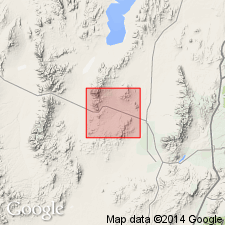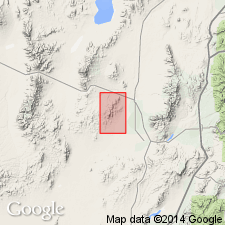
- Usage in publication:
-
- Elephant limestone*
- Modifications:
-
- Named
- Dominant lithology:
-
- Shale
- Limestone
- AAPG geologic province:
-
- Great Basin province
Summary:
Named for Elephant Canyon, T28S, R12W, Beaver Co, UT in the Great Basin province. No type locality designated. Forms an outcrop band one-fourth to one-half a mi wide in Star district in southeast part of map area. Geologic map; columnar section. In the northern part of the district, the Elephant is more siliceous and is made up of interbedded siliceous shale and limestone more than 1,000 ft thick. In the southern part of the district, the Elephant is heavy-bedded, blue, dolomitic and in part siliceous limestone. [Thickness not stated for southern half.] Fossils listed (brachiopods). Conformably overlies the Pennsylvanian? Talisman quartzite (new). Conformably overlies the Triassic Harrington formation (new). Assigned to the Pennsylvanian?.
Source: GNU records (USGS DDS-6; Denver GNULEX).

- Usage in publication:
-
- Elephant limestone
- Modifications:
-
- Not used
Summary:
Not used. Name Kaibab Limestone replaces name Elephant Limestone (Butler, 1913) in report area.
Source: GNU records (USGS DDS-6; Denver GNULEX).
For more information, please contact Nancy Stamm, Geologic Names Committee Secretary.
Asterisk (*) indicates published by U.S. Geological Survey authors.
"No current usage" (†) implies that a name has been abandoned or has fallen into disuse. Former usage and, if known, replacement name given in parentheses ( ).
Slash (/) indicates name conflicts with nomenclatural guidelines (CSN, 1933; ACSN, 1961, 1970; NACSN, 1983, 2005, 2021). May be explained within brackets ([ ]).

